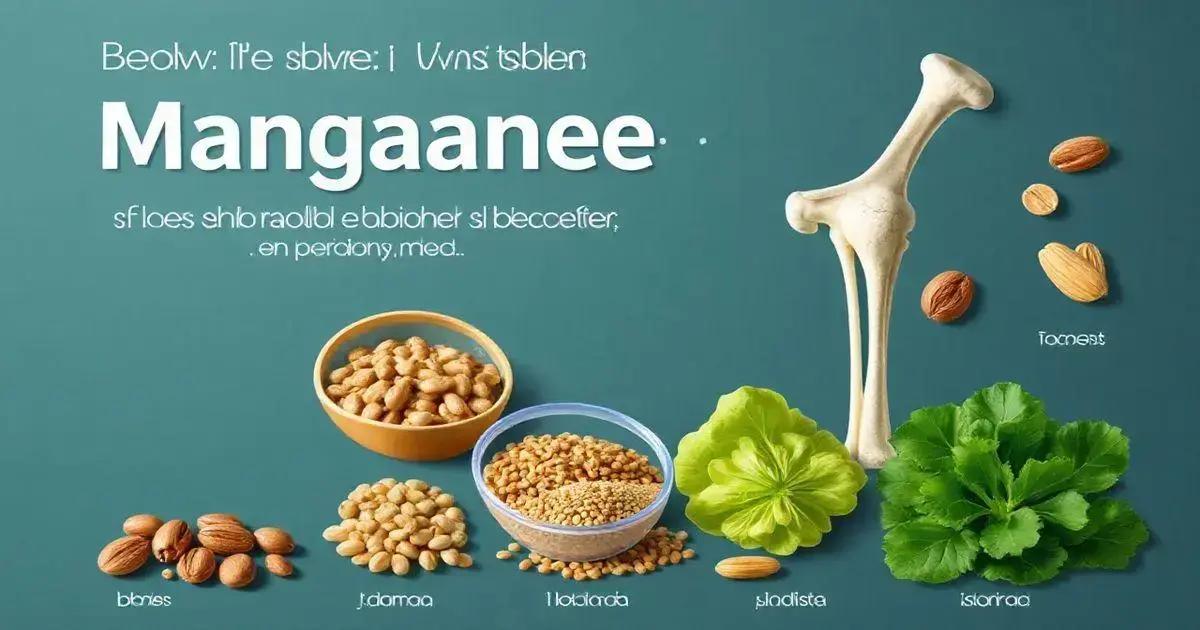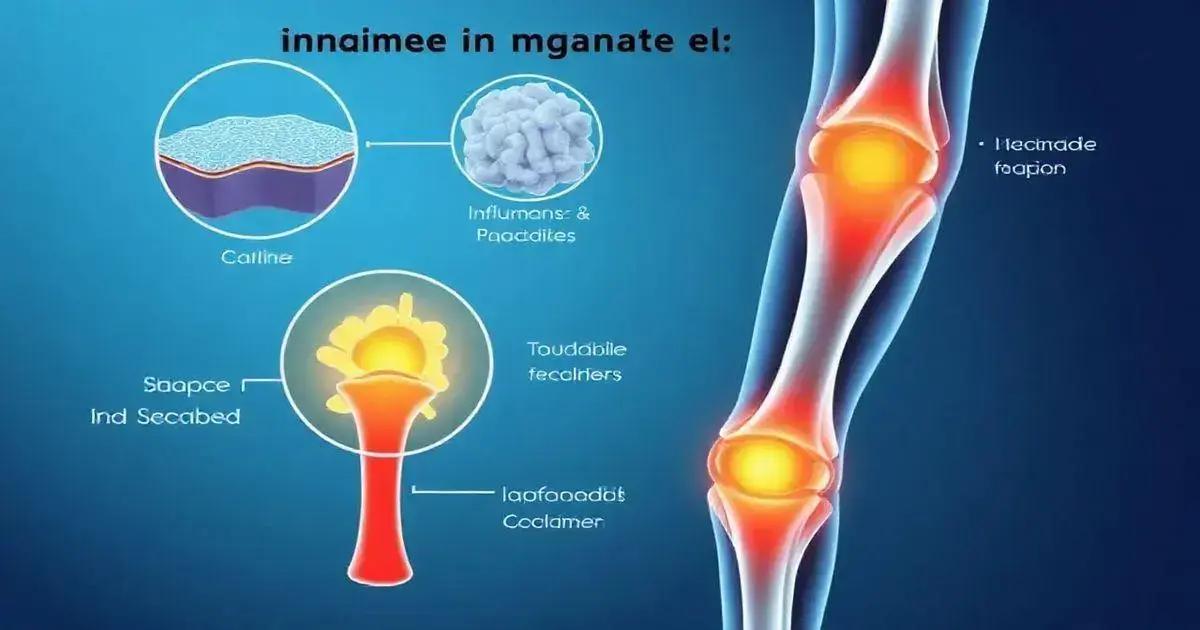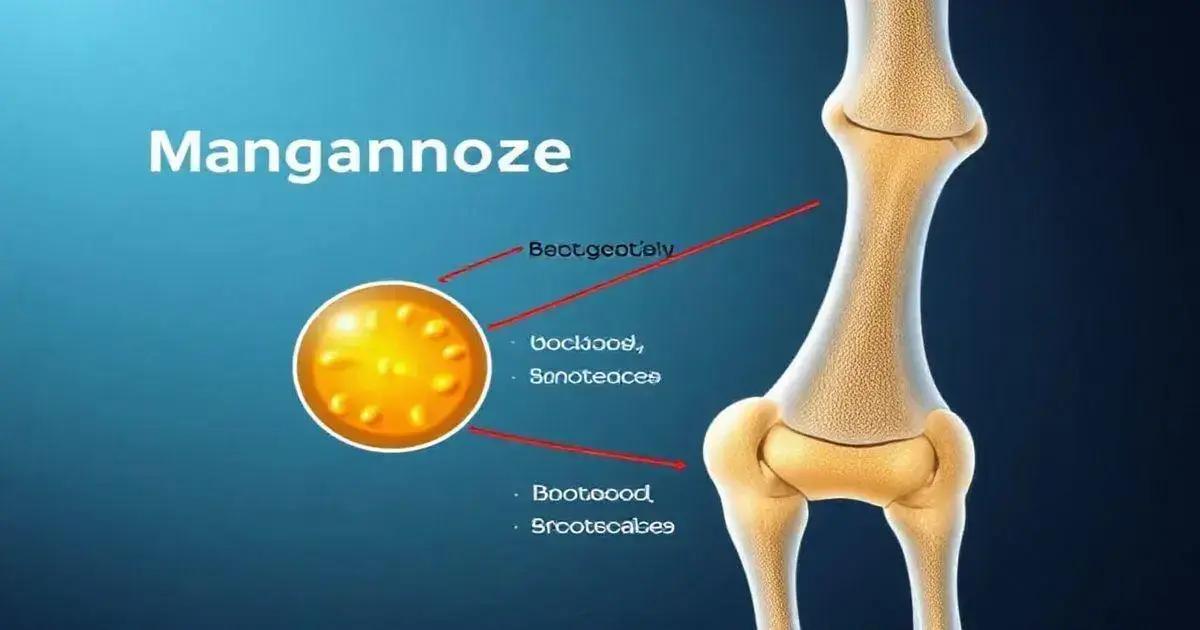Manganese plays a crucial role in joint and bone health by aiding in collagen synthesis, reducing inflammation, and supporting bone density. Key sources of manganese include whole grains, nuts, seeds, and leafy greens, which can help prevent conditions like osteoporosis and promote overall well-being.
The role of manganese in joint and bone health is essential for anyone looking to maintain mobility and prevent discomfort. This trace mineral helps in the formation of connective tissues and aids in the absorption of calcium, which is vital for bone health. In this article, we will delve into how manganese contributes to joint stability, its impact on bone density, and the best dietary sources to ensure adequate intake.
Understanding Manganese and Its Benefits

Manganese is a trace mineral that plays a critical role in many bodily functions. It is crucial for the formation of bones, the metabolism of nutrients, and the functioning of enzymes. In addition, manganese helps in the development of connective tissues, which are essential for joint health.
Benefits of Manganese
One of the key benefits of manganese is its role in bone formation. This mineral assists in the production of key proteins that are necessary for cartilage health and bone density. The presence of adequate manganese levels can help prevent bone-related issues such as osteoporosis.
Manganese also contributes to antioxidant defense. It is an essential component of superoxide dismutase, an antioxidant enzyme that protects cells from oxidative damage. This can be particularly beneficial for reducing inflammation in joints and promoting overall joint health.
Supporting Joint Health
In addition to its benefits for bones, manganese is vital for maintaining the integrity of joint cartilage. It aids in the synthesis of glycosaminoglycans, which are important for cartilage structure and function. This means that manganese deficiency can lead to increased risk of joint pain and degeneration.
Importance of a Balanced Diet
To maximize the benefits of manganese for joint and bone health, it is important to include it as part of a balanced diet. Foods rich in manganese include nuts, whole grains, leafy green vegetables, and tea. By consuming a diverse range of these foods, you can help ensure that your body receives enough manganese to support joint and bone health.
How Manganese Affects Joint Health

Manganese plays a vital role in maintaining healthy joints. This essential mineral aids in the production of glycosaminoglycans, which are critical components of cartilage. Cartilage helps cushion the joints, allowing for smooth movement and reducing friction during physical activities.
Reducing Inflammation
One of the key ways that manganese supports joint health is through its anti-inflammatory properties. Inflammation in the joints can lead to pain and stiffness, making it difficult to perform daily activities. By helping to reduce inflammation, manganese can contribute to overall joint comfort and mobility.
Collagen Synthesis
Manganese is also essential for the synthesis of collagen, the protein that forms the structural framework of cartilage, tendons, and ligaments. Adequate collagen levels are necessary for joint stability and function. A lack of manganese can impede collagen production, resulting in weakened joint integrity.
Preventing Degenerative Diseases
By supporting proper cartilage maintenance and reducing inflammation, manganese may help prevent degenerative joint diseases such as osteoarthritis. Many studies indicate that a diet rich in manganese is associated with a lower risk of developing joint issues and chronic pain over time.
The Connection Between Manganese and Bone Density

The connection between manganese and bone density is significant for maintaining strong bones. Manganese is essential for the formation of bone mineral density, which determines the strength and structure of bones.
Bone Mineralization
Manganese aids in bone mineralization, a process that helps deposit key minerals into the bone matrix. This process is crucial for developing compact and dense bones. Without sufficient manganese, bones may become brittle and susceptible to fractures.
Role in Calcium Absorption
An interesting fact about manganese is that it interfaces with calcium metabolism in the body. Manganese helps improve calcium absorption in the intestines, ensuring bones receive the minerals they need for proper density. A balanced level of manganese contributes to the overall effectiveness of calcium in supporting bone health.
Impact on Osteoporosis
Research has shown that adequate manganese levels may be linked to a lower risk of osteoporosis, especially in older adults. Osteoporosis is a condition characterized by weak and fragile bones, often leading to fractures. By maintaining sufficient manganese levels, individuals can help reduce their risk of developing this serious condition.
Collagen and Bone Strength
Manganese is also vital for synthesizing collagen, a protein that provides structure and flexibility to bones. Collagen contributes to the strength of bones, making it an essential component for maintaining bone density as we age. A deficiency in manganese can lead to weaker collagen and, consequently, lower bone density.
Sources of Manganese for Optimal Health

To ensure optimal health, it is important to include sources of manganese in your diet. Manganese can be found in various foods, making it easy to obtain the recommended daily intake.
Whole Grains
Whole grains are excellent sources of manganese. Foods like brown rice, quinoa, and oats are rich in this essential mineral. Incorporating these whole grains into your meals can help boost your manganese levels significantly.
Nuts and Seeds
Nuts and seeds are not only healthy but also packed with manganese. Hazelnuts, almonds, and pumpkin seeds are great choices. A handful of these nuts and seeds can easily contribute to your daily manganese intake.
Leafy Green Vegetables
Leafy greens like spinach, kale, and collard greens provide a natural source of manganese. These vegetables are also loaded with nutrients, making them a valuable addition to your diet.
Other Sources
In addition to the foods mentioned, tea, tofu, and edamame are excellent sources of manganese. Including a variety of these foods in your diet will not only help maintain your manganese levels but also promote overall health.
In Summary: The Crucial Role of Manganese
Manganese is an essential trace mineral that plays a vital role in maintaining joint and bone health. From aiding in collagen synthesis and inflammation reduction to supporting bone density, manganese has numerous benefits.
Ensuring that you receive adequate manganese through a balanced diet, which includes whole grains, nuts, seeds, and leafy greens, is key to promoting optimal health. By understanding the importance of this mineral and its sources, you can take proactive steps toward healthier bones and joints.
Incorporate these manganese-rich foods into your daily meals to enjoy the full spectrum of benefits that this essential nutrient offers.
FAQ – Frequently Asked Questions about Manganese and Health
What is the role of manganese in joint health?
Manganese helps in the formation of connective tissues, reduces inflammation, and is essential for collagen synthesis, which supports joint health.
How does manganese affect bone density?
Manganese contributes to bone mineralization, calcium absorption, and collagen production, which are vital for maintaining strong bone density.
What foods are high in manganese?
Foods rich in manganese include whole grains, nuts, seeds, leafy green vegetables, tea, tofu, and edamame.
Can manganese help prevent osteoporosis?
Adequate manganese intake is associated with lower risks of osteoporosis, as it supports bone density and overall bone health.
How much manganese do I need daily?
The recommended daily intake of manganese varies by age and sex, but generally, adult men need about 2.3 mg and women need about 1.8 mg.
Are there any side effects from too much manganese?
Excessive manganese intake can lead to toxicity, causing neurological issues, so it is important to consume it in appropriate amounts.













